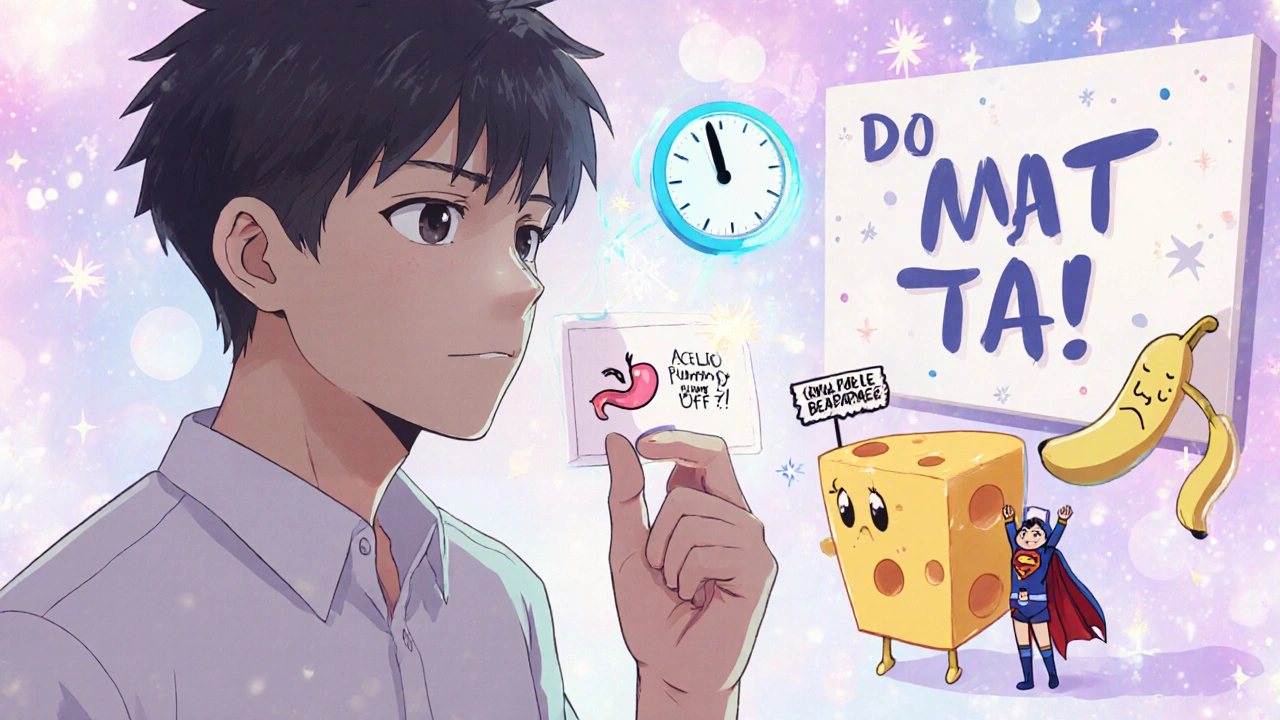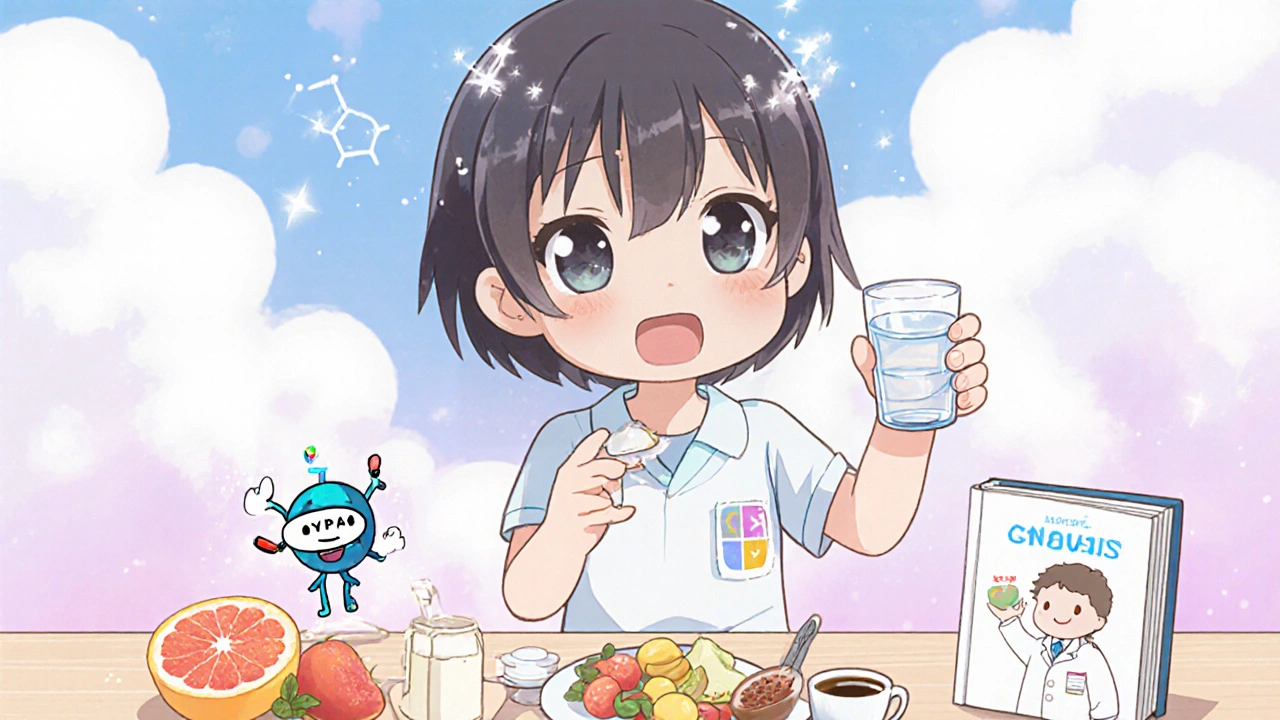When you take a pill, you might think only the medicine matters. But what you eat - or don’t eat - can change how that pill works in your body. Sometimes food makes a drug stronger. Sometimes it stops it from working at all. And in some cases, eating the wrong thing can land you in the hospital.
Why Food Changes How Medicines Work
Food doesn’t just fill your stomach. It changes the environment inside it. Your stomach acid, the fat in your meal, even the fiber in your veggies - all of it can interfere with how your body absorbs, breaks down, or uses a medicine. There are three main ways food messes with meds:- Absorption: Food can block your body from soaking up the drug properly.
- Metabolism: Some foods slow down or speed up how your liver breaks down the medicine.
- Effect: Food can directly fight or boost the drug’s action in your body.
These aren’t rare glitches. About 30% of bad drug reactions come from food interactions, according to the American Society of Health-System Pharmacists. That’s millions of people every year.
Food That Blocks Absorption
Some medicines need an empty stomach to work. If you take them with food, your body might only absorb half - or less. Levothyroxine (for thyroid problems) is one of the most sensitive. Taking it with breakfast cuts its effectiveness by 34%. The rule? Wait at least 60 minutes after taking it before eating. Even coffee, milk, or orange juice can interfere. Tetracycline antibiotics (like doxycycline) bind to calcium. That means dairy - milk, yogurt, cheese - can stop the drug from working. The fix? Take it 2 hours before or 4 hours after any dairy. Same goes for antacids or calcium supplements. Fluoroquinolones like ciprofloxacin? They lose up to 90% of their power when taken with calcium, iron, or zinc. That includes fortified cereals, multivitamins, and even some bottled waters. Take them on an empty stomach. If you must eat, wait two hours.Food That Makes Drugs Too Strong
Grapefruit juice is the most famous offender. It doesn’t just interact - it shuts down an enzyme in your gut (CYP3A4) that normally breaks down certain drugs. Without that brake, the drug floods your bloodstream. Take simvastatin (a cholesterol drug). Drink grapefruit juice with it, and your blood levels jump by 330%. That raises your risk of muscle damage, kidney failure, and worse. Even one glass a day can do this. And it’s not just grapefruit - pomelo, Seville oranges, and some hybrids do the same. Other drugs affected include:- Some blood pressure meds (like felodipine)
- Anti-anxiety drugs (like buspirone)
- Some immunosuppressants (like cyclosporine)
Bottom line: If your pill bottle says “avoid grapefruit,” don’t even think about it. No exceptions.
Food That Neutralizes Your Medicine
Warfarin (a blood thinner) is tricky. It works by blocking vitamin K, which helps your blood clot. But if you suddenly eat a lot of vitamin K - say, a big plate of spinach, kale, or broccoli - your blood starts clotting again. That’s dangerous. The key isn’t avoiding vitamin K. It’s keeping it consistent. Eat about the same amount every day. One cup of cooked spinach has 483 mcg of vitamin K. A salad with half a cup of kale? That’s nearly 500 mcg. If you normally eat a small salad and suddenly switch to a big one, your INR (blood clotting test) can swing wildly. Patients who track their vitamin K intake have 28% fewer dangerous fluctuations, according to the American Heart Association.Food That Helps - Or Hurts - Your Stomach
Some drugs irritate your stomach. That’s why people think: “I should take it with food.” Sometimes that’s right. Sometimes it’s wrong. NSAIDs like ibuprofen and naproxen? Taking them on an empty stomach raises your risk of ulcers by 15%. Eating with them cuts that risk to 4%. So yes - take these with food. But proton pump inhibitors like omeprazole? They work best when taken 30-60 minutes before your first meal. Food turns off the acid pumps they’re trying to block. Take them after eating? You’re wasting the drug. Antibiotics like amoxicillin? Food doesn’t hurt them. You can take them with meals to avoid nausea.Medications That Need Extreme Caution
Some drugs have strict food rules because the risks are life-threatening. MAO inhibitors (used for depression or Parkinson’s) can cause a sudden, deadly spike in blood pressure if you eat foods high in tyramine. That includes:- Aged cheeses (like cheddar, blue cheese, parmesan - up to 400 mg tyramine per serving)
- Cured meats (salami, pepperoni)
- Fermented soy (soy sauce, miso)
- Tap beer and red wine
One bite of blue cheese with an MAOI can send you to the ER. This isn’t a “maybe.” It’s a hard rule.
On the flip side, SSRIs like sertraline or escitalopram? Most don’t have food restrictions. You can take them with or without meals. No need to stress.

What You Can Do Right Now
You don’t need to memorize every food-drug combo. But you can protect yourself with these simple steps:- Ask your pharmacist when you pick up a new prescription: “Does food affect this?” Don’t assume it’s safe.
- Read the label. “Take on empty stomach” means 1 hour before or 2 hours after food. “Take with food” means eat something - even a cracker - at the same time.
- Use a pill organizer with meal times marked. A 12-hospital study showed this cuts errors by 47%.
- Track your diet if you’re on warfarin. Use a free app or a notebook. Consistency beats perfection.
- Never drink grapefruit juice unless your doctor says it’s okay. And if you’re on a statin? Just skip it.
Most people don’t know how serious these interactions are. A 2024 report found that 68% of patients don’t understand what “take on empty stomach” means. 54% have never heard of grapefruit interactions. And 41% think all meds should be taken with food - which is flat-out wrong for many drugs.
What’s Changing in 2025
The FDA now requires new drugs to include clear food interaction warnings on labels - with exact timing instructions. That’s a big step. Also, starting January 1, 2025, Medicare Part D patients starting high-risk medications (like warfarin, statins, MAOIs) must get mandatory counseling from a pharmacist about food interactions. That’s 12.7 million seniors covered. New apps like MyMedSchedule (from the NIH) use AI to build personalized schedules based on your meals, sleep, and meds. In trials, users had 35% fewer food-drug mistakes.Bottom Line: Know Your Meds, Know Your Meals
Food isn’t the enemy. But it’s a powerful player in how your medicine works. A banana might be fine with your blood pressure pill. A slice of cheddar could be dangerous with your antidepressant. Grapefruit juice? Never with statins. Don’t guess. Ask. Write it down. Stick to the timing. Your body will thank you.Can I take my medication with water?
Yes, water is the safest drink to take with most medications. Avoid juice, milk, coffee, or alcohol unless your doctor says it’s okay. Water won’t interfere with absorption or metabolism.
What if I forget and take my pill with food?
If you took a medication that should be on an empty stomach, don’t panic. Don’t double up. Just wait until your next scheduled dose and go back to the correct timing. If you’re unsure, call your pharmacist. For drugs like levothyroxine or antibiotics, one mistake won’t ruin treatment - but repeated ones can.
Do herbal supplements count as food?
Yes. Supplements like St. John’s Wort, garlic, ginseng, and vitamin E can interact with medications just like food. St. John’s Wort, for example, can make birth control, antidepressants, and blood thinners less effective. Always tell your doctor and pharmacist what supplements you take.
Why does grapefruit affect some drugs but not others?
Grapefruit blocks an enzyme called CYP3A4, which breaks down certain drugs in the gut. Only medications that rely on this enzyme to be metabolized are affected. Statins, some blood pressure meds, and immunosuppressants are on that list. Others, like most antibiotics or acetaminophen, use different pathways - so grapefruit won’t touch them.
Can I switch to a different medication to avoid food restrictions?
Sometimes, yes. For example, if you love grapefruit and take simvastatin, your doctor might switch you to rosuvastatin or pravastatin - which aren’t affected. Warfarin can sometimes be replaced with apixaban, which has far fewer food interactions. Always talk to your doctor before switching - don’t change meds on your own.
Is it okay to take meds with a snack?
It depends on the drug. If the label says “take on an empty stomach,” even a small snack like a banana or a handful of nuts can interfere. If it says “take with food,” then a light snack is fine - and often recommended. When in doubt, ask your pharmacist: “Is a cracker okay?”



Comments
So let me get this straight - we’re now living in a world where your banana could be a silent assassin to your thyroid med? I mean, if I take my levothyroxine and then eat an avocado, am I basically performing a biohacking experiment on myself? And who decided food should be this complicated? I didn’t sign up for a PhD in pharmacognosy just to eat breakfast.
It’s like our bodies are these delicate, overworked espresso machines and every meal is a different bean blend. One wrong grind and the whole system explodes. I’m just here for the coffee and the chaos.
Also, grapefruit juice is basically the witchcraft of modern medicine. One sip and suddenly your liver’s having a nervous breakdown. Who even invented this stuff? Some mad scientist in a lab coat sipping tea and cackling? I’m convinced the FDA is just a cover for the Illuminati’s nutrition division.
It is, indeed, a matter of profound clinical significance that dietary intake can modulate pharmacokinetic parameters to such a degree that therapeutic efficacy is compromised or adverse events are potentiated. The empirical evidence cited herein is not merely anecdotal but substantiated by peer-reviewed pharmacodynamic studies conducted by reputable institutions. One cannot, therefore, treat the ingestion of food as a trivial or ancillary variable in medication regimens. The onus is squarely upon the patient to adhere with precision, and upon the healthcare system to communicate these directives with unambiguous clarity. Failure to do so constitutes a systemic breach of patient safety protocols.
Oh wow. So now I’m supposed to stop eating cheese because I take an antidepressant? And I thought my emotional breakdowns were just from my ex texting ‘u up?’ at 2am.
Let me get this - if I eat blue cheese, I might die? But if I eat 3 bags of chips and cry into my pillow while watching reruns of Grey’s Anatomy? That’s just Tuesday.
Also, why is no one talking about how the *pharmaceutical industry* profits off this confusion? I mean, if they just made drugs that didn’t hate food, we wouldn’t need 17 different apps and 37 pamphlets. But then, where’s the revenue stream? 🤔
OMG I JUST REALIZED I’VE BEEN TAKING MY CIPRO WITH MY MORNING SMOOTHIE 😱
AND I THOUGHT I WAS BEING SO HEALTHY WITH MY KALE AND SPINACH AND ALMOND MILK 🙈
NO WONDERS I FELT LIKE A ZOMBIE FOR 3 WEEKS. I’M SWITCHING TO WATER. LIKE, RIGHT NOW. ALSO I’M BUYING A PILL ORGANIZER BECAUSE I’M A MESS BUT NOT A DEAD MESS. #medsnotgamess #pharmacistmyhero
Let me just say this - if you’re taking warfarin and you think ‘eating spinach once a week’ is fine, you’re one salad away from a stroke. I’ve seen it. My aunt thought consistency meant ‘I eat greens on Tuesdays and Fridays.’ No. Consistency means you eat the same damn amount every day. Like, same grams. Same leaves. Same guilt.
And don’t even get me started on people who take St. John’s Wort because ‘it’s natural’ - natural doesn’t mean safe. Natural is what your cat eats when it finds a plant on the balcony. You’re not a cat. You’re a human with a prescription. Act like it.
Also, grapefruit juice isn’t ‘a little risky.’ It’s a chemical grenade in a juice box. If your doctor didn’t warn you, they’re not your doctor. Find a new one. And no, ‘I like the taste’ is not a valid argument. Neither is ‘but my cousin drinks it and she’s fine.’ Your cousin isn’t on simvastatin. Your cousin is a liability.
Levothyroxine with coffee is a no-go but what about tea? Green tea? Black? Does the caffeine matter or just the calcium? And what about oat milk? Is it the same as dairy? I’ve been taking mine with my almond milk latte and now I’m paranoid.
Also, the part about MAOIs and aged cheese - is it the aging process that creates the tyramine? Or is it just the type of milk? Like, can I have fresh mozzarella? Or is everything from the deli counter a death trap? I need specifics. I don’t want to live in fear of cheese.
This is such an important post. I wish more people knew how much food affects meds - I used to take my blood pressure pill with grapefruit juice because I thought it was ‘healthy.’ I had no idea.
Now I keep a little notebook next to my pill organizer and write down what I ate and when. It’s not perfect, but it’s helped me feel more in control. Small changes make a big difference. Thank you for sharing this clearly.
Western medicine is a joke. In India, we take medicine with food because it’s tradition. You think your liver cares about your ‘empty stomach’? Your liver has seen worse. Your body is not a lab rat. Stop overcomplicating. Eat. Take pill. Live.
Back home in Kerala, my grandmother would say: ‘Medicine is like rain - it falls where it lands, and the body drinks what it needs.’ She never read a label. She never used an app. She took her pills with rice, turmeric, and a prayer.
And she lived to 98.
Maybe we’re missing the point. Science gives us rules. But wisdom? Wisdom is knowing when to bend them - and when to let your body speak.
Still… I’ll avoid the grapefruit. Just in case.
Let’s be real - the FDA’s new ‘mandatory counseling’ rule is just a distraction. They don’t care if you live or die. They care about liability. The real reason they’re pushing this is because lawsuits from grapefruit deaths are skyrocketing. They’re not protecting you. They’re protecting the corporations.
And don’t even get me started on ‘MyMedSchedule’ - that app is probably collecting your diet data to sell to Big Pharma. They already know what you eat. They just want you to think you’re in control.
Take your meds. Drink water. Don’t trust anything with a logo.
You got this. It’s okay to feel overwhelmed. I used to forget if I took my meds before or after lunch. Now I set three alarms and put sticky notes on my mirror. One says ‘NO GRAPES’ in big red letters. Another says ‘WATER ONLY.’ I’m not perfect - but I’m trying.
And if you mess up once? It’s not the end. Just reset. Breathe. Ask your pharmacist. They’re your allies. You’re not alone in this. We’re all learning.
Wait so if I take my omeprazole after eating it doesn’t work? I’ve been doing it wrong for 5 years?? I thought the point was to reduce acid so why not take it after the spicy taco? 😭
Also I just realized I’ve been taking my antibiotics with yogurt because I thought it ‘helped my gut’ - guess I’ve been giving my bacteria a free pass. I’m so dumb.